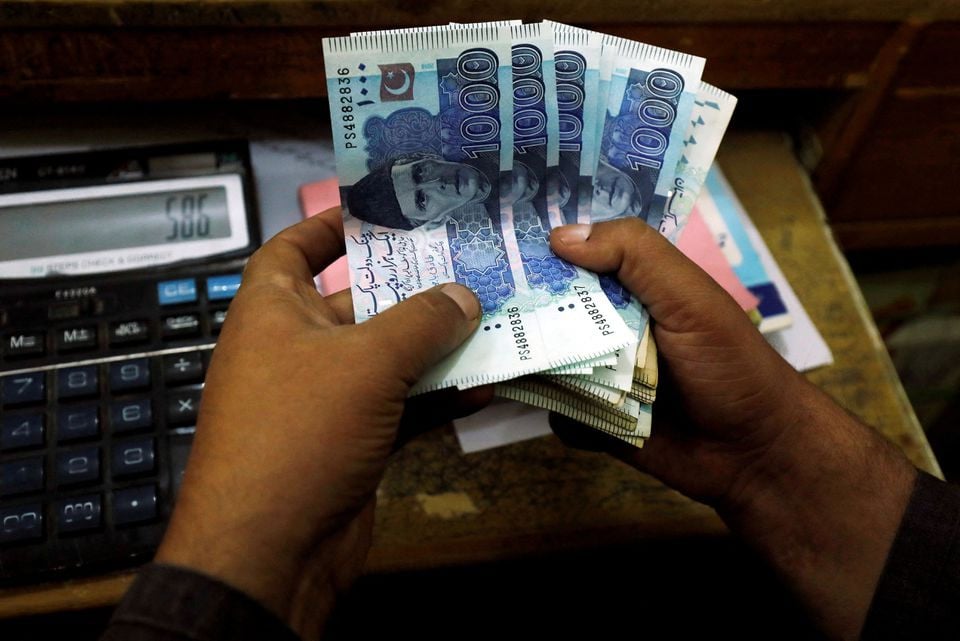
Commercial bank borrowing from the central bank has grown by 3% after deposits dipped 1% in April, compared to March, as the cash-strapped government continued to acquire large amounts of debt from domestic banks.
Citing State Bank of Pakistan’s (SBP) data, JS Global research house reported that bank borrowing from the central bank rose by 3%, or Rs317 billion, to Rs9.65 trillion in April compared to a month earlier. At the same time, deposits at commercial banks dropped 1% month-on-month, or Rs133 billion, to Rs23.43 trillion in April 2023.
Domestic bank borrowing from the SBP has been on the rise since the International Monetary Fund (IMF) barred the government from taking loans directly from the central bank in mid-2019 and asked it to borrow from commercial banks for bridging its budget deficit.
Since then commercial banks have been acquiring loans from the central bank and meeting the government’s financing requirement. The central bank provides funds at lower rates compared to the returns at which banks lend money to the government. There is usually a 1-3% difference between the two rates.
Therefore, the borrowing does not negatively impact banks instead it positively contributes to their rising incomes.
The central bank injects funds into commercial banks through open market operations (OMOs) while banks extend financing to the government by buying its sovereign debt securities including treasury bills (T-bills) and Pakistan Investment Bonds (PIBs).
On a year-on-year basis, commercial bank borrowing from the SBP spiked 49% to Rs9.65 trillion in April compared to the same month of last year, according to the central bank data.
On the other hand, the month-on-month dip in bank deposits can be linked with a six-decade high inflation of 36.4% in April. Owing to the soaring inflation, spending by the government, private sector and households spiked while their monthly incomes remained stagnant. Meanwhile, the government’s revenue receipts remained lower than its expenditures. It comes as a large number of factories have been shut completely or partially while around five million people have lost their job in recent months.
A majority of them must be meeting their expenses through spending the savings parked in banks. Talking to The Express Tribune, Topline Securities Director Research Yousuf M Farooq said the bigger issue behind bank financing numbers “is that the government has crowded out the private sector.”
He said that rulers were making hefty borrowing from commercial banks amid lower-than-required tax revenue collection. It was leaving a very little room for extending credit to the private sector, which “is not a good sign and is hurting the economy at large”.
“Availability of financing for the private sector will definitely generate economic activities and create job opportunities,” he remarked.
Farooq noted that government debt had piled up with domestic debt doubling in the past five years to Rs38 trillion as on December 31, 2022.
Consequently, mark-up payment for the mounting public debt has jumped up and most of the government borrowing is being utilised on this account.
KASB Securities Head of Research Yousuf Rahman said the other day “banks were pulling financing out of the economy and giving it to the government.”
The government, on the other hand, was mostly utilising the funds for non-productive purposes including mark-up payment, he pointed out. Data suggested that government borrowing from commercial banks increased by 29% to Rs19.69 trillion in April compared to the same month of last year.
However, bank financing for the private sector rose just 14% year-on-year to Rs12.11 trillion in April. At the same time, bank deposits expanded by 17% to Rs23.43 trillion. Similarly, bank investment (lending to the government) to deposit ratio (IDR) jumped 8.2 percentage points to 84% in April. Contrary to that, banks’ advance (lending to the private sector) to deposit ratio (ADR) dropped 1.4 percentage points to 52% in the month under review.
Published in The Express Tribune, May 14th, 2023.
Like Business on Facebook, follow @TribuneBiz on Twitter to stay informed and join in the conversation.


1732274008-0/Ariana-Grande-and-Kristin-Chenoweth-(1)1732274008-0-165x106.webp)















COMMENTS (8)
Comments are moderated and generally will be posted if they are on-topic and not abusive.
For more information, please see our Comments FAQ